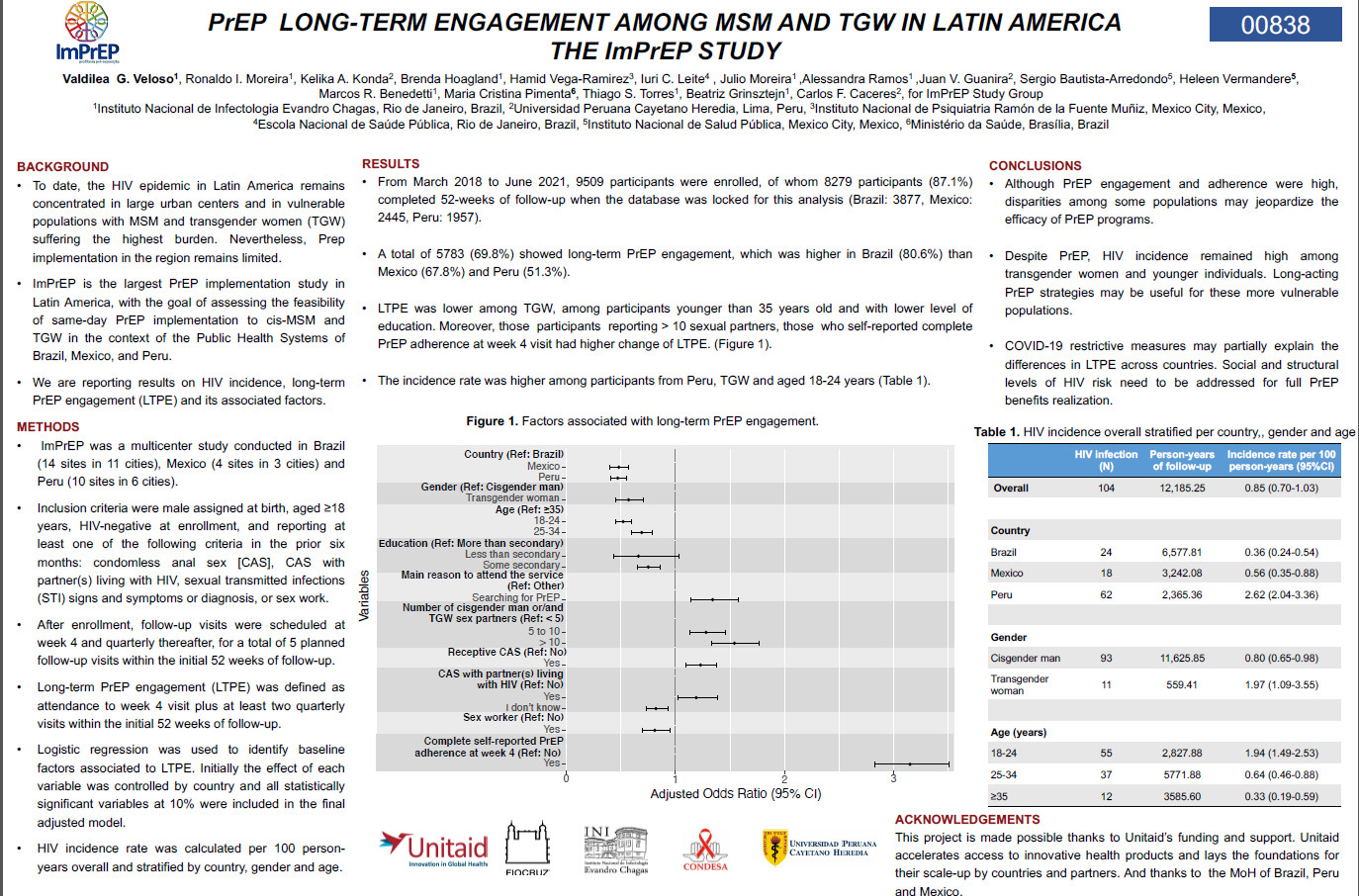Catálogo general VIH

Mental mealth and PrEP adherence among MSM/non-cisgender people from Latin America
Resumen
Pre-exposure prophylaxis (PrEP) is an effective HIV prevention strategy among men who have sex with men (MSM) and trans women. Mental health well-being and substance use decrease adherence to antiretroviral treatment among people living with HIV, but their role in PrEP adherence is still unclear. We sought to assess the association of mental health well-being, depression, substance use, and other characteristics with self-reported PrEP adherence. This is a secondary analysis of an online survey conducted from May to August 2021 in Brazil, Mexico, and Peru where the willingness to use different PrEP modalities was explored. We used a subsample of daily PrEP (d-PrEP) users and assessed sociodemographic data, mental health well-being and depression scores, sexual behavior, alcohol use, and substance use. Participants were ?18 years, MSM or non-cisgender people who gave their informed consent. Adherence to d-PrEP was evaluated based on self-report number of pills taken per week in the last month and them dichotomized into two groups: perfect adherence (7 pills/week) and non-perfect (<7 pills/week). We used the SF-36 and the PHQ-2 to assess mental health well-being and depression scores, respectively. We performed simple logistic regressions with each variable and kept the significant ones ([i]P[/i]<0.1) to develop a final multivariate logistic model. Out of our sample of 1,415 d-PrEP users, 1,313 completed the questionnaire. The median age was 34 (IQR: 29-40), 87.1% were from Brazil, 10.3% from Mexico and 2.6% from Peru, the majority were MSM (98.3%) and had more than secondary education (79.9%). Perfect adherence to d-PrEP was reported by 93.2% of the participants, 23% were classified as depressed, and the median mental health score was 21 (IQR: 17-24). Overall, perfect adherence to d-PrEP was associated with higher mental health well-being score, higher numbers of sexual partners, and regular use of geosocial networking apps. On the other hand, depression and having a stable partner decreased the odds of perfect d-PrEP adherence. Nevertheless, after the adjusted model only having a stable partner and high number of sexual partners remain associated with perfect d-PrEP (Table 1). The role of depression and mental health well-being on PrEP adherence is still unclear, but behavioral/relational variables (i.e. having a steady partner; numbers of partners) are associated with d-PrEP adherence.- Tema:
Autoría:
VEGA RAMÍREZ, E. Hamid; GUILLÉN-DÍAZ BARRIGA, Centli; DIAZ, Dulce; KONDA, Kelika Anne; TORRES, Thiago S.; ELORREAGA REYES, Oliver A.; HOAGLAND, Brenda; GUANIRA CARRANZA, Juan Vicente; BENEDETTI, Marcos R.; BAUTISTA ARREDONDO, Sergio; GRINSZTEJN, Beatriz; CÁCERES PALACIOS, Carlos Fernando; VELOSO, Valdilea G.
Ficha bibliográfica
- Año de publicación:
- 2022
- Descripción física:
- [1] p.
- Formato:
- Folleto
- Tipo de documento:
- Coloquios y ponencias
- Notas:
- Póster presentado el CROI (Conference on retroviruses and Opportunistic Infections) 2022 celebrado del 12 al 16 de febrero.
- Más información:
-
Contenidos relacionados
También te pueden interesar
-
PrEP long-term engagement among MSM and TGW in Latin America : the ImPrEP study
-
Predictors of knowledge of and access to biomedical prevention among MSM and transgender men in Latin America: results from the Latin American internet survey
-
Latin American Internet Survey for men who have sex with men (LAMIS-2018): design, methods and implementation





